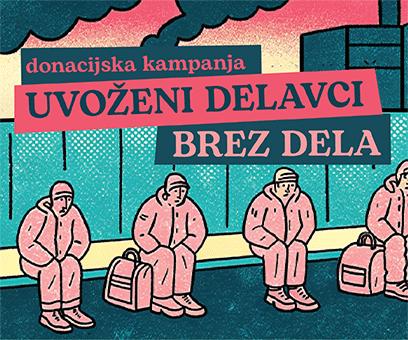KITAJCI VSEH DEŽEL, ZDRUŽITE SE!
Izraz nova levica na Kitajskem zaobjema pretežno akademike, večinoma izobražene na zahodu, ki na Kitajskem zagovarjajo nekoliko bolj progresiven način razvoja od obstoječega. Termin nova levica, ki so ga vpeljali njeni nasprotniki ima sicer v kitajskem kontekstu slabšalen prizvok in predstavlja poizkus povezave s tako imenovano staro levico iz časov Maa Zedonga, predvsem pa kulturno revolucijo in njenimi ekscesi. To obdobje je na današnjem kitajskem percepirano predvsem kot obdobje neobvladljivega političnega nasilja.
Nova levica je sicer od stare relativno striktno ločena, tako časovno, kot ideološko, kot kadrovsko. Kot akademsko gibanje se je konstituirala v drugi polovici devetdesetih let prejšnjega stoletja. Ideološko je precej bližje socialdemokratski drži kot revolucionarnemu duhu Maoizma. Kadrovsko pa jo sestavljajo člani mlajše generacije, začenši s tistimi, ki so se v akademski svet podajali konec osemdesetih let in so v nasprotju z bivšimi revolucionarji večinoma pripadniki akademske elite. Kot zanimivost dodajmo, da so nekateri izmed vidnejših pripadnikov te struje na Trgu nebeškega miru protestirali z zahtevami po demokratizaciji, posledično pa so bili poslani na tako imenovano preizobraževanje skozi delo na podeželje. Tam so, po lastnih besedah spoznali drugo plat liberalizacije gospodarstva in svoja liberalna načela zamenjali za progresivnejša. Preizobraževanje je bilo torej več kot uspešno. Začetke nove levice opiše njen pripadnik Zhun Xu, sicer profesor ekonomije na Howard University:
In the 1980s what happened in China was that the chinese government started a massive reform, that gradually led China to capitalism - the current model of chinese society. Now, in the 1980s the workers and the intellectuals and a number of other occupations - they still enjoyed pretty much what they had during the socialist era. They still had very good pensions, they had very good welfare etc. And the economy was growing in the 1980s and everyone was benefiting from the reform and the economic growth. So there is a widespread support for further capitalist reform - that includes support from the students, from the intellectuals, from the workers. And the concensus during the 1980s was how to get rid of socialism as soon as possible.
But in the 1990s things changed. The working class and the intellectuals - they finnaly realised what capitalism is. In the late 1990s the chinese capitalist reform reaches the stage when there was massive layoff from the state-owned enterprises - we normally say 30 million workers lost their jobs overnight. And they lost all the previous welfare, all the good compensation, all the prestige that they enjoyed. At the same time very few people, who are either communist party cadres or they are relatives of the people who are in power - they very easily took over, they privatised state-owned enterprises and suddenly got rich. And there's huge inequality created in a very short time. At the same time, if you look at the intellectuals - the students and people who work in higher education occupation - they also suffered, because, similarly, they would feel this huge inequality and the feel the threat of unemployment as well. And so everything was turning against itself. The society that they lived in was very different from what they expected in the 1980s. And that is basically, I think, the social basis for the rise of the new left.
Xu opiše še katere so glavne programske točke kitajske nove levice:
I think the most natural policy proposition from the new left is that - you know there is untied privatization campaign. Because, as I mentioned, workers and intellectuals, they all suffered from massive privatization campaign in China from the 1990s onwards. And still there is a considerable amount of state-owned enterprises in China and the capitalists are still trying to privatise everyone of them. And so the resistance, the struggle against privatisation continues. And one of the key moments was in 2009, when - there was a large steel factory in China - when they tried to privatise it, the workers had a huge takeover movement. And they beat the agents of capitalism - you know the manager, who tried to implement privatisation - he was beaten to death by the workers! And that became really a high moment of the whole struggle against privatisation.
And the second part of that struggle, different from the untied privatisation, is a pursuit for a living wage. There is a, especially when you look at the export oriented sectors in China - those workers who work in the coastal cities, who work for multinational companies, they often recieve minimal wages. Really they are living in miserable conditions. According to recent estimates they have been consistently underpaid 30 percent - 30 percent less than what would constitute a living wage. You know the very basic compensation that covered all the basic life necessities. So that has been a continuing theme for the working class - to struggle for a living wage. Now, that living wage not only includes a higher compensation - a wage - but also includes the struggle to reduce labour time - the working hours. The two things often go together.
Now, a third part of the new left struggle really concentrates on environment. And most of the struggle concentrates on the concept of environmental justice. Because in the period of rapid economic growth in China, most of the time capitalists - the so called enterprenours - they do not have to pay for the pollution or the environmental damage that they do. They only get the profits. Only the residents - the working class - they would suffer from the environmental damage. Recently, I think gradually, especially over the last 10 or 5 years, this environmental consciousness really became very strong. You already see massive scale of protest against this type of environmental damage from the big companies - either from China or from abroad. So that's one form of environmental struggle. The other form is the so called food sovereignty struggle. And that food sovereignty struggle involves protest against the genetically modified crops. Currently that has been really widespread in China, including GM cotton and also GM rice. And that also involves a pursuit of a more environmentally friendly way of agriculture - less use of chemical fertiliser, more organic food, etc. I think those environmental-related strugles are really a rising and very strong components of the new left struggles in China.
So, I think the three - untied privatisation, the living wage and environmental protection - constitute the main proposal of the new left proposal in China.
Iz slišanega sledi, da je program kitajske nove levice precej podoben novim levičarskim strankam v Evropi in preogresivnim posameznikom znotraj ene izmed strank v ZDA. Kljub temu, da ni radikalen, temveč socialdemokratski predstavlja korak v pozitivno smer. Ob tem pa se zastavlja vprašanje na kakšen način nova levica skuša svoj program implementirati in pri tem se pokažejo njene pomankljivosti. Eli Friedman, profesor sociologije na Cornell University postavi dve kritiki. Prva je delovanje pretežno znotraj elitnih krogov, torej preko povezav med akademsko in partijsko elito, s tem povezana pa je nezmožnost postaviti kritiko partije in kitajskih nacionalnih ciljev, predvsem cilja zasedbe mesta na vrhu svetovnega kapitalističnega sistema.
The new left is mostly associated with this group of intellectuals, who are elites. They are mostly educated in the west and have come back - many of them have come back and occupied positions at elite universities. There is a lot of, sort of elite level connections, where people in universities have connections with people in the party and can influence policy that way.
And secondly, and I think much more importaintly and this is a critique of the way the chinese new left in general has been organised, is an inability to have a critique of nationalism. It is still largely tied to the project of "national rejuvenation of China". It doesn't have any kind of and internationalist vision - which is unusua, right, for a leftist, if you see classes as an importaint social category, then it should not be limited to a particular country. So I think that by and large, this is a problem for the new left - basically the inability to get rid of these kind of nationalist tendencies. And related to that is an inability to critique the state, or what I think is sort of naive optimism about the ability of the state to represent the interests of the workers, peasants and other people without property.
Ogibanje konfliktom s partijo je v kitajskem političnem kontekstu seveda lahko taktičen pristop. A hkrati pomeni odvisnost od dobre volje ostalih, pogosto močnejših interesov znotraj partije, kar se je pokazalo v času vladavine Xi Jinpinga. Ena izmed prvih potez novega predsednika je bil zagon protikorupcijske kampanje. Ta ima na nižjih nivojih partije nedvomno protikorupcijski značaj, v vrhovih partijske strukture pa ima nemalo značilnosti frakcijske čistke. En odmevnejših primerov je bila obsodba Bo Xilai-ja, partijskega sekretarja v provinci Chongqing, kasneje pa še njegovih višje pozicioniranih zaveznikov. Bo Xilai je bil karizmatičen politik in splošno sprejet kot kandidat za najvišje partijske pozicije, kot tak pa tudi tekmec Xi Jinpinga. Bil pa je tudi neuradni kandidat nove levice, saj je v času vodenja Chongqinga uvajal progresivne ukrepe. Poleg eliminacije političnega nasprotnika je šlo v primeru Bo Xilai-ja torej tudi za eliminacijo najvišje pozicioniranega zagovornika nove levice. Eli Friedman opiše razloge za podporo Bo Xilai-u med pripadniki nove levice:
Bo Xilai was a model for the new left because he put some of the ideas that people have been having into practice. Most notably, he was interested in maintaining a large role of the state in the economy. He was taking some of the profits from state-owned firms and reinvesting it in socialprogrammes, like housing. The housing programmes are probably the most notable thing that he was doing to increase public housing - it is a big issue in urban China, because the real estate market has been totally insane and a lot of people have been priced out of the market. He developed a scheme for allowing rural residents to switch their land rights for rights to social services in the cities, which also at the time was somewhat unusual. And in terms of his style, he was very much styled after this kind of 1960s maoist approach to politics. I think famously he gathered people together in public areas and they would sing what they call red songs, which were songs from the maoist era, which extolled the virutes of the proletariat and things like that. So I think some pople saw some promise. For me, I think there was still never any capacity to really question capitalism.
Poleg čistke v partijskih vrhovih je Xi Jinping počistil tudi z dobršnim delom delavcem prijazne zakonodaje in discipliniral civilnodružbene skupine. Nova levica s svojo družbeno pozicijo, načinom dela in ideološko kompromitranostjo proti takšnim ukrepom ni bila zmožna zastaviti resne opozicije. Nadaljuje Friedman:
I think people would say that from early 2000s up until maybe 2 years ago at the policy level China was moving broadly in a left sort-of direction. There was an increase in social spending, the government passed a series of labour laws that made it more likely that workers would have labour contracts and which increased the cost to employers for not giving employees contracts, it made it easier for workers to file legal cases of mediation arbitration. So in general thjey were moving in kind of, not a sort of radical left, but kind of a socialdemocratic direction to try to make sure the gains of growth were more evenly distributed.
So what we've seen under Xi Jinping is a move decidedly back to the right. And so they've been moving ahead with privatisation of those state-owned firms that I mentioned, they've been discussing revising some of the laws that they passed in 2007, which will esentially reduce the number of protections for workers and they've also announced a freeze in increases in minimum wages in Guangdong province, which is a sort of industrial heartland of China and probably freezes in minimum wages in most other cities around the country. So, things have taken a really bad turn to the right. Calling it a form of neo-fascism might be putting it to far - everytime you mention fascism people get all kind of anxious - but under Xi Jinping things have become much more repressive politically. Not just for worker organisations, even for sort-of elites: he's rounded up hundreds of lawyers, so called rights defence lawyers, they've imprisioned feminist activists, they've imprisioned people from labour NGOs. Thing have definitely moved in a decidedly pro-right direction.
The problem with all of this is that workers don't have their own organisation and the capacity to independently participate in politics. You have an official trade union, called the All China federation of trade unions, which is controlled by the communist party. And they are the ones who are supposed to represent workers. And sometimes they do and sometimes they push for more pro-labour legislation. But they also don't have any independent power from the communist party. So when the communist party decides that they want to move in a less pro-labour direction, the union doesn't have any capacity to resist that, as would be the case if you had independent worker organisations.
Kljub od partije odvisni progresivni akademski eliti in odsotnosti neodvisne delavske organizacije se delavci na Kitajskem množično organizirajo. Tovrstno samoorganiziranje je močno lokalizirano in ponavadi omejeno na posamezno tovarno, poleg tega pa tudi ni trajno, temveč projektno z namenom naslavljanja točno določenih kršitev delavskih pravic. Načine organiziranja opiše Friedman:
The first importaint distinction to make is between the workers who are in the state sector, the workers who work for state-owned firms, and then workers in the private sector. And workers in the private sector - if we're talking about manufacturing - are mostly migrant workers. Those are people who come from the country-side to the city. Now, I'm more familiar with the latter kind of protest - amongst the migrant workers. But people who've been paying attention to the news in the past couple of weeks will see, there's been an increase of protest among workers in the state sector, because the state is engaging in yet another round of privatisation and market reform. That's something to keep your eyes on. But the thing that I've payed much more attention to over the past several years is migrant worker protest.
The most common source of conflict for migrant workers in probably non-payment of wages or non-payment of social insurance - things like pension and health insurance that they are supposed to get by law. We've certainly seen in the past years, as China's economy has slowed down, an increasing number of cases where employers are simply not paying their workers. So when this happens, typically workers will still attempt to go through some sort of legal channels and get the government involved. But as I mentioned there's a pretty strong alliance between local governments and employers, so in most cases the governments will side with employers. So when this happens, strikes are quite common. And to call China the epicenter of global labour unrest sounds a little bit dramatc . in part it's just because China's so large, so it's not surprising that there more strikes in China than in any other country. But there've been a huge number of strikes. And there's a great internet resource, called China labour bulletin and you can go to their strike map and track the increase of strikes.
So, the most common way that worker organise is within a single factory and they do it based on, oftentimes on pre-existing social networks. Frequently people, when they come to cities, will come with people from their home-town and they have this things called hone-town associations, where people would speak a common dialect or something like that. That's a frequent way in which they're organised, but oftentimes they are organised just because people meet each other on the assembly line and in most cases for migrant workers they're living in dormitories. So dormitories also provide a space, where they can get to know each other and where they can organise withour being observed by the boss. People've also talked about the extent to which they can use the internet and social media and this provides some possibilities. I think people in the west sometimes get a little bit too excited about the possibilities of social media. Chinese government controlls social media very closely and there's some good research out there that shows that people can air their opinions on social media, but when you try to organise collective action the government will censor that very quickly.
Delavsko samoorganiziranje je torej na Kitajskem močno razširjeno, a nepovezano in brez enotne ideologije ali političnega programa. V zadnjih nekaj letih pa so v porastu progresivne študentske skupine, ki se aktivno povezujejo in sodelujejo z delavstvom. Opiše Zhun Xu:
For example if you go to any major college in China you would find, definitely in recent times, more than one leftist student group in any college. And those groups, what they do, basically, they go to the workers camps in contruction sites or in other places and they talk to them and they try to connect with them. And they try to help them with all kinds of things. They help them to bargain for wages, they help them with all the legal stuff, they also facilitate them with any kinds of struggles. There is also a more advanced form of this. There are many leftist organisations in China. They all have, everyone of them I would say, a working class base. And I think it's already become a regular thing for them to trya to connect the so called academic part and the political part together. And it has been going on very frequently for the last couple of years. But we don't see a lot of media coverage of them, because if the west reports this it can often become dangerous for them. There are securty concerns. I would say this kind of cooperation is happening and is happening more and more often, compared to 5 or 10 years ago.
Povezovanje progresivnih intelektualnih gibanj z delavsko bazo v enotno politično gibanje so mokre sanje vsakega pravega levičarja. Da pa obstoj takšnega povezovanja ni le plod navdušenja pripadnikov nove levice potrdi tudi Eli Friedman, čeprav je glede njegovega obsega bolj previden:
These student groups, I should really emphasise, are not particularly wide-spread at this point. It's really still in just a couple of places. But I noticed it this quite clearly, you know I've been going to China for more than 15 years, and after 2008, when the economic crisis happened, you begin to see students taking interest in radical politics. Clearest indication of this was that people began setting up marxist reading groups on university campuses around the country and just reading Marx. And many of them took inspiration from this. And this is again particularly true in some of southern and eastern coastal cities, where there's a lot of factories. But students were kind of looking around to see what was going on and there was a huge amount of workers protest and obviously huge amount of exploitation and so some students began building connections with these workers, putting together some publications, in some cases going to work in factories to try to built more substantive connections with workers and to also further research ends to be able to better understand what's actually happening in the factories. And in some cases organising, what I would say qualifies as a realy, genuine axe of student-worker solidarity. Now these instances are still few and far between, but I think even the fact that students have this kind of orientation represents something of an advance. So I think there's some promise there.
Kljub temu spodbudnemu razvoju dogodkov pa v delovanju kitajske nove levice zeva velika luknja. Kitajsko podeželje je, prav tako kot mestne tovarne, prepredeno z družbenimi konflikti, ki jih prinaša razvoj kapitalizma, primarno zaradi degradacije okolja in komodifikacije zemlje. A kljub potencialu, ki ga tovrstni konflikti nudijo za razvoj progresivnega gibanja so levičarska gibanja osredotočena predvsem v mestih. Zaključi Xu:
That, unfortunatelly ... the countryside is a neglected place. It's a ... the irony is that there's a really slow development of capitalism in the chinese countryside. You see increasing gap between the urban areas and the rural areas. And all the young generation, they move from rural areas to the cities and the working class as well. If you go to any village in China nowadays, what you see is what we call that you have infants on the on side andthe grandmas and the grandpas on the other. So, actually, at least in the contemporary stage of development the capitalists concentrate in the cities and the leftists also concentrate in the cities.
So, the only type of major resistance or movement in the countryside I've seen in the recent years is the environmental movement. For the rural areas it is often that they are the victims o environmental pollution: with the water pollution, with the air pollution - they often get affected most. Because they don't have tap water and many other thing, once the water gets polluted, they have no other way. So I think that's part of the reason why we see a lot of such environmental struggles in the vilages.
The other part of struggle that we've seen in villages is related to the land. As I mention every household is entitled to a small plot of land. But in the places close to the cities there is the potential of real estate development and oftentimes the developers, sometime big corporations, they try to grab the land at a very low price. And they often do that via corruption - they buy this land from corrupted government officials. And the peasants, the villagers, often recieve very little for that. So, that's also part of those sources of conflict in the villages.
Overall there is potential, but for whatever reason we haven't seen the real development of progressive movement from the countryside. Most of us, most of [progressive] people still work in the cities.











Dodaj komentar
Komentiraj